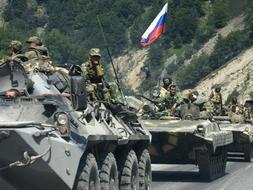
William O. Beeman, New America Media, Aug 12, 2008
Editor’s Note: The Bush Administration’s push for access to oil from the Caspian Sea and it’s desire to isolate Iran precipitated the Russian invasion of Georgia. William O. Beeman is professor and chair of the department of anthropology at the University of Minnesota. He has lived and worked in the Middle East region for more than 30 years.
No one should be surprised that U.S. interference in the Caucasus has led to the Russian invasion of South Ossetia. By mixing into the volatile politics of the Caucasus, and trying to recruit the governments there to become American “plumbers” for a variety of purposes, the United States has only drawn Russian fire.
The Caucasus was one of the last territories added to the Russian Empire in the 19th century. It was captured from the Qajar Empire of Iran. The Caucasians never were fully incorporated into Greater Russia, and maintained a fierce cultural separatism. Georgia in particular was proudly nationalistic, with a distinctive language, cuisine, literary tradition and writing system.
It is arguable that had Josef Stalin not been Georgian, the Caucasian region might never have been part of the Soviet Union. Georgia chafed under Soviet rule, and the wily Soviets enlisted other Caucasian minorities to keep the peace in the region, including the Ossetians. However, Stalinist nationalities philosophy made sure that no one ethnic group ever became too strong. One way to do this was to draw borders in such a way that groups would be split by administrative boundaries. The division between North and South Ossetia was one of these divisions.
The fall of the Soviet Union created three new independent nations in the Caucasus: Georgia, Azerbaijan and Armenia. Almost immediately the ethnic enclaves in all of these nations began to fulminate for territorial reunification with their co-ethnic populations in other nations. These included South Ossetia and Abkhazia in Georgia, Nakhchivan in Armenia, which is mostly Azerbaijani; and Nagorno-Karabakh in Azerbaijan, which is mostly Armenian.
Enter the United States. U.S. interests in this region were vastly different than that of the people of the region, or of Russia. The United States wanted access to Caspian Sea oil, and it wanted to contain Iran. The Caucasian nations were ideal for both purposes. The United States blasted ahead with no regard for the historical tensions in the region.
Therefore the United States blindly pursued a steady policy of propping up the dictatorial regimes of the region. Georgia, Azerbaijan and Armenia are among the most corrupt nations on earth, and it was easy to buy a government. The price for this support was unquestioning alliance with the United States and its regional policies.
Access to Caspian oil was one burning policy goal of all administrations since 1990. The easy route for transport of petroleum products from the region would be through Iran’s well developed pipeline system. Literally just a few miles of pipeline would connect the Azerbaijani oil fields to the Iranian system. However, Washington was ready to do almost anything to avoid providing any economic benefit to Iran. Hence, working with U.S. petroleum producers, they constructed a difficult and tortuous pipeline across Azerbaijan and Georgia, to emerge in Turkey for shipping to the world. Many millions in government bribes changed hands to make this happen.
As Iran became a target of the George W. Bush administration, having friendly powers in the Caucasus became a priority for the Washington establishment. The Velvet Revolution in Georgia was aided by the United States. In Azerbaijan, the United States virtually installed the current president, Ilham Aliyev, son of the previous president for life, Heydar Aliyev. The election itself was highly controversial. Heydar Aliyev was in Cleveland, Ohio for medical treatment, and was rumored to have died four months before his son was elected. The United States government was reportedly involved in the cover-up, and supported Ilham’s election despite mass protests among Azerbaijani citizens.
President Mikheil Saakashvili of Georgia has close ties to the United States, having graduated with law degrees from Columbia and George Washington Universities. He was the leader of the Rose Revolution in 2003, which ousted President Eduard Shevardnadze, former Soviet foreign minister, and striking a blow for Georgian independence. Elected president in 2004, he also greatly improved ties with Israel, and received an honorary doctorate from Haifa University, and has allowed Israeli intelligence to operate in Georgia. All of this endeared him to the Bush administration.
The United States tried to engineer the entrance of Georgia into NATO in April, 2008, but was surprised when 10 NATO members vetoed the proposal. Russia viewed this as a hostile act on the part of the United States.
President Saakashvili’s presidency has not stopped continual ethnic violence from breakaway regions in his country. The South Ossetia conflict is only one of the latest, but it was different in that it serves as a smokescreen for Russian attacks on Saakashvili’s government.
If Saakashvili should be ousted from office, a major U.S. and Israeli outpost would be lost. The fate of the oil pipeline would be in danger, and pressure on Iran would lessen considerably. All of these outcomes are seen as disastrous for the Bush administration. Thus all of the hi